Your AI Career Coach: A Neural Network Design to Prepare You for a Career Change
COVID-19 had a huge impact on employment in the US – while many people lost their jobs, others took the time as an opportunity to reflect on their careers and long-term goals. If you’ve been contemplating a career change, you’re not alone – according to FutureLearn’s recent Future of Learning report, 15% of millennials and Generation Z in the U.S., UK, and Australia have reevaluated their career path as a result of the pandemic – now is the perfect time to dust off your resume and level up your skills for a job in the future economy.
But how do you land that dream job? Deciphering exactly what skills hiring managers and teams are looking for can be stressful. But have you ever considered artificial intelligence as a resource for your job search? Research lab OpenAI has provoked chills throughout Silicon Valley with their latest AI text generator, GPT-3. FutureLearn’s team of forward thinkers put this revolutionary tech to the test by prompting it to provide online course recommendations for those looking to make a career jump.
From there, HR employees in industries ranging from tech to the medical field were surveyed and our team found that 59% of them think advice from artificial intelligence can help job seekers score the perfect gig, and another 63% think AI can provide useful job seeking advice to candidates. Read on to learn more about how FutureLearn used GPT-3 to generate career advice then asked real-life HR professionals for their thoughts on the generated advice and whether a candidate with those skills (and experience on their resume) would do well in a job search.
Soft Skills to Win Them Over
When looking at where our virtual adviser missed the mark in each industry, a majority of the skills were soft skills – or things that aren’t as tangible – like knowing mathematical equations, Excel formulas, or CPR. These skills are more difficult to quantify. We asked our AI consultant to provide us with some soft skills that all applicants, regardless of industry, should focus on exemplifying.
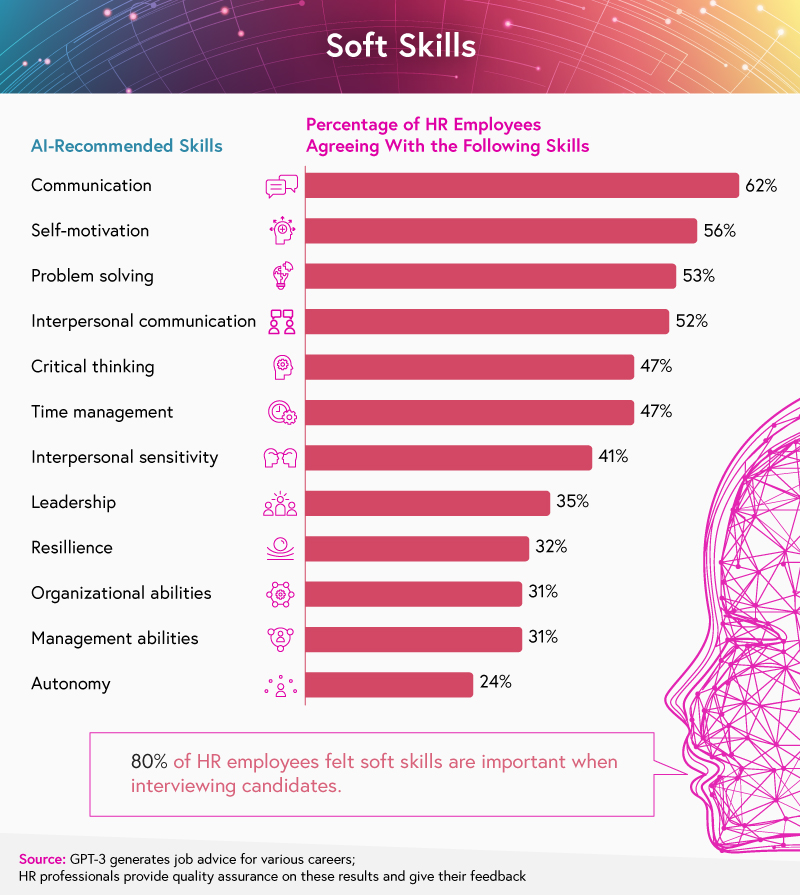
Our AI adviser said that communication skills were one of the most important soft skills you could have, and 62% of all HR employees we surveyed agreed.
- Only 24% of HR employees agreed autonomy was an important soft skill. In fact, many of the HR employees cited teamwork and collaboration as being important for candidates.
- Motivating yourself was a skill that 56% of HR employees found important, perhaps due to the evolving work environments over the last year.
- Less than half of HR specialists found critical thinking, time management, interpersonal sensitivity, leadership, resilience, organization, management, and autonomy to be essential for applicants.
- In 2020, LinkedIn released a list of soft skills that employers were looking for. LinkedIn’s top 5 skills were related to how we work with other people, which ties back to our AI adviser suggesting employees have strong communication, problem solving, and interpersonal skills. LinkedIn also said that emotional intelligence was among the top 5 soft skills employers are prioritizing. Our AI bot suggested this, too (interpersonal sensitivity), and 41% of HR specialists agreed.
Soft skills can be difficult to learn, and finding a place to build these skills can be difficult. But, our AI adviser suggested online courses were a great way to level up your abilities, not only for soft skills but in terms of hard skills, too.
Comparing Human vs. AI Advice
This chart explores the success of job advice given by artificial intelligence. We took the advice that was generated by GPT-3 specific to each of these industries and cross-checked it all by HR professionals – asking them the likelihood a candidate would land an interview if they had the skills AI recommended.

While none of the industries we explored reached a 100% success rate, the AI adviser was still able to win over more than half of the HR specialists in each field we queried.
- GPT-3 offered the most successful advice to people looking for jobs in the retail industry, according to HR professionals in this field.
- For advice pertaining to landing a job in the medical or education industries, 82% of advice was useful according to HR professionals in these industries.
- The advice related to landing a job in a political field was the least successful at a rate of only 69%.
Recommendations in Retail
When it comes to the most successful advice, AI pretty much nailed what those searching for a job in retail should master. Ninety percent of HR employees agreed with the skills AI suggested.
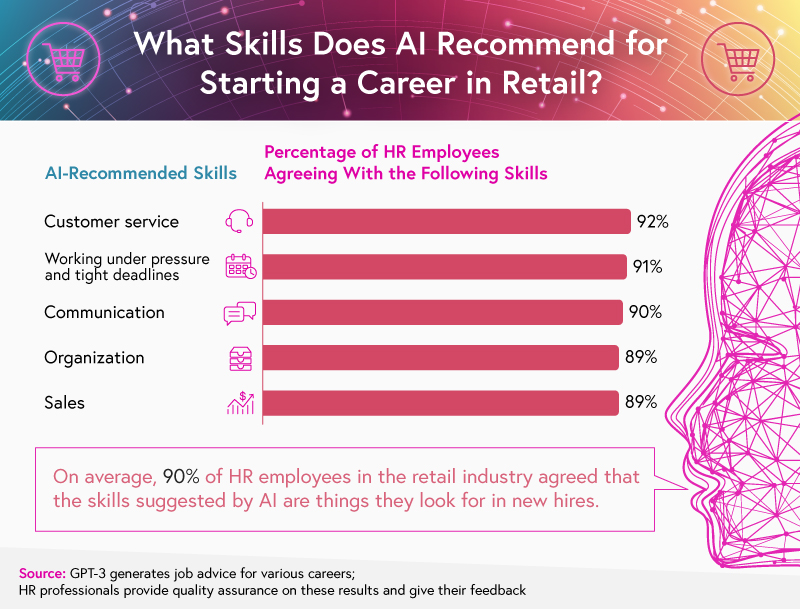
Retail employees should be masters at customer service, working under pressure, communicating, organizing, and – of course – sales.
- HR employees also wanted applicants to show patience, be a team player, and have a strong work ethic. Although not initially recommended by our AI adviser, these skills in conjunction with our AI’s advice could just land you the job you’ve been waiting for.
Making It in Medical
While medical education is important, there are also a few skills beyond formal training that medical HR specialists seek out. Hiring managers expect applicants in the medical field to show their people skills, such as compassion and patience. As far as AI, read on to find out what our virtual adviser suggested.
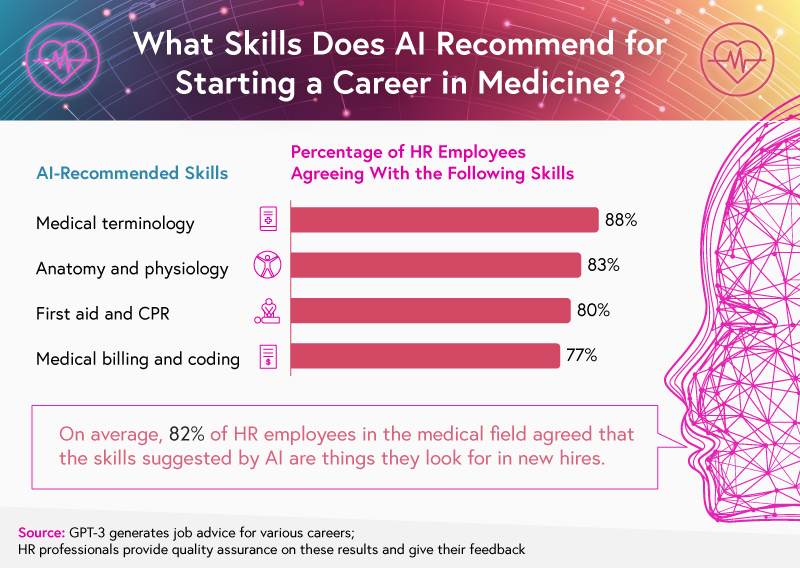
While AI missed the mark in suggesting more soft skills, it was spot on in recommending applicants know their medical terminology.
- 88% of hiring managers said knowledge of medical terminology is important for candidates.
- Medical billing and coding were also important for candidates as were things like knowing parts of the body and life-saving techniques.
Entering Education
In the education industry, we found that, on average, 83% of HR employees agreed that the AI-suggested skills were ones they looked for in new hires, but 17%, on average, weren’t so sure.
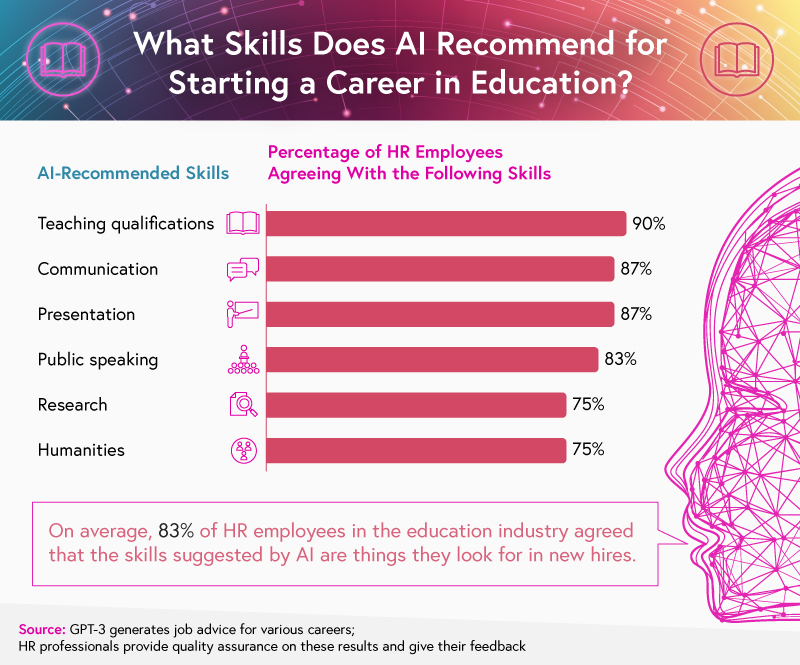
- Even more so than the tech industry, 87% of HR specialists agreed with all of AI’s suggested skills.
- Communicating and presenting were key skills that those looking to break into the educational field should master and exemplify on their applications.
HR professionals agreed with AI when asked what skills they looked for – citing communication and teaching qualifications frequently. Hiring managers wanted candidates to show that they were patient and good at problem solving, two skills that weren’t initially recommended by our AI adviser.
Entertaining a New Career
Arts and entertainment careers are attractive opportunities for creative types. For anyone looking for career tips to end up in this industry, AI was decent at suggesting skills. In fact, 79% of HR employees, on average, agreed with its advice.
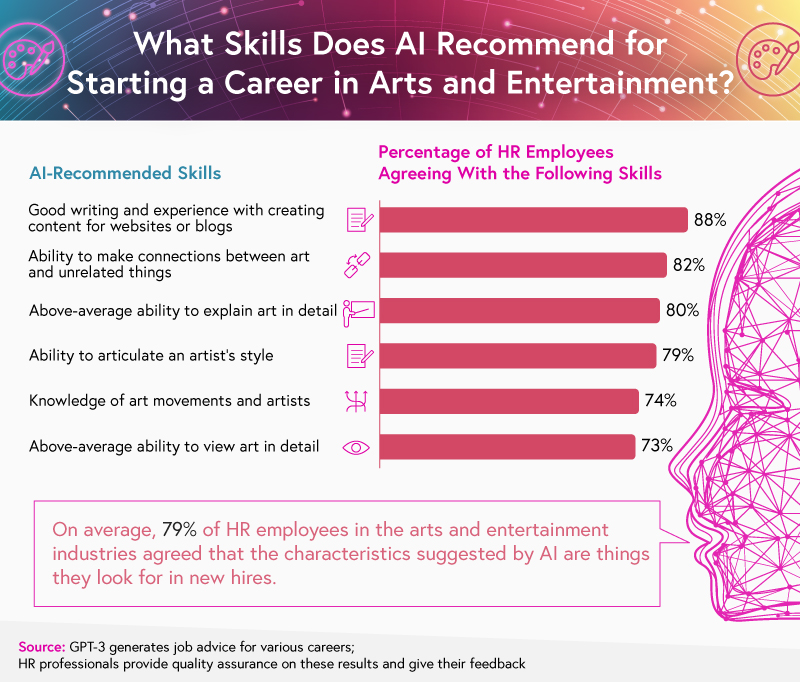
- Strong writing skills and experience creating content were key for hiring managers, with 88% of them expecting to see these skills in an applicant.
- Critical thinking and the ability to explain concepts were also important for these hiring managers.
- Flexibility was something that hiring professionals in this industry wanted to see but not something that our AI suggested.
Transitioning to Tech
An example of the prompt provided to GPT-3 looked a little something like this:
“To give yourself an edge over other candidates in this field, it is also recommended that you learn at least one new programming language every year.”
From there we found that GPT-3 continued this prompt with the following skills:
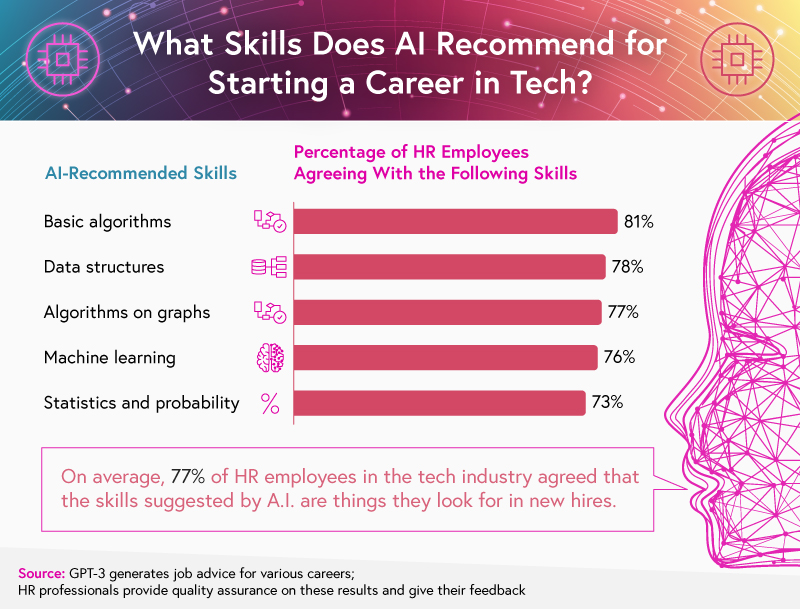
Tech is a booming industry that people are looking to break into, and many need advice on where to start. Our AI adviser suggested skills in basic algorithms, data structures, algorithms on graphs, machine learning, and statistics and probability.
- Of the skills suggested by AI, more than 70% of tech HR specialists said they looked for these in new hires.
- HR specialists agreed and said basic algorithms, data structures, and tech algorithms were the skills in tech they looked for in new hires.
Conversely, on average, 23% of HR employees didn’t agree with the skills that AI suggested for job seekers. Instead, HR specialists in the tech field said they wanted to see applicants with coding and programming languages under their belt, as well as communication and people skills.
A Future in Finance
Jobs in finance span across a variety of industries and serve a multitude of purposes. Mastering key skills in this field can be exactly what you need to stand out among the masses and land an interview for that dream finance job you’ve been eyeing.
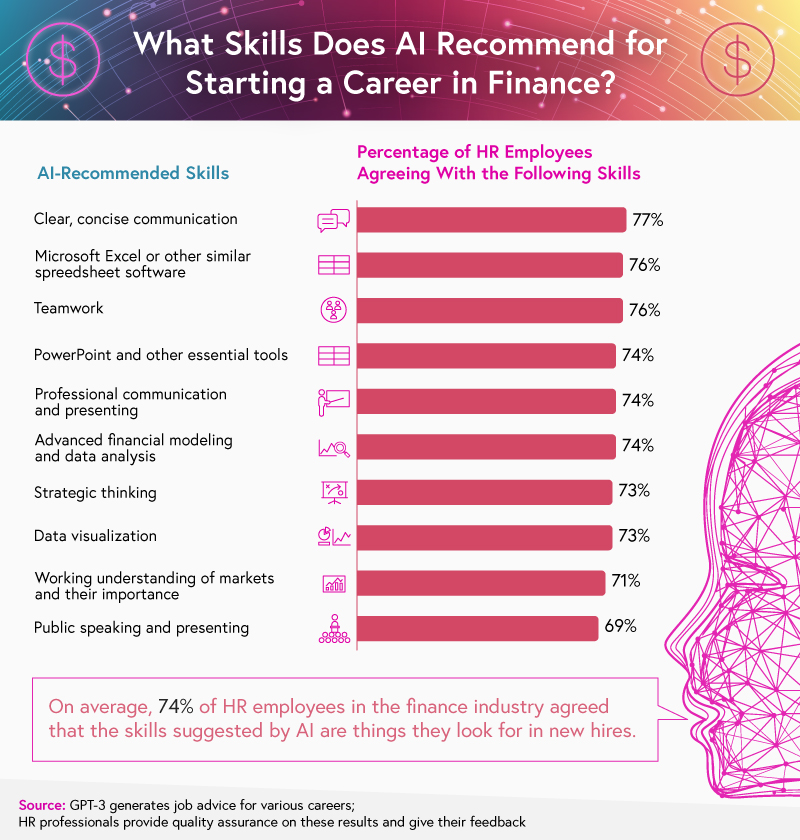
A common mistake many people make is that they try to get a job in finance without having any work experience. Job seekers can build up their experience through online courses to level up their skills before they embark on internships and personal projects that showcase their competence in key skills HR specialists look for. In fact, hiring managers frequently admitted to looking for training and education that applicants had completed when it comes to landing a job in finance. These skills were overlooked by AI but important to the people reviewing applicants.
Here’s what AI did get right, though:
- Communication is actually extremely important to those in the finance industry. This is likely due to having to explain complex numbers or formulas to people who may not know data as well as the person working with it.
- Interestingly, working as a team was the second-most agreed-upon skill for those in finance as well, followed by having great Excel or Google Sheets skills.
- A piece of feedback that has been consistent across industries so far is the importance of soft skills (interpersonal advice), like being able to “assess” and “communicate accurately.”
Landing the Job
We found that communication was a key skill regardless of which industry you work in, and teamwork was pretty important. No matter where you get your career advice, leveling up and reskilling is important to standing out in every field. Hanna Celina – Director of Insights at FutureLearn – remarked that “AI can be a powerful tool to help explore career options. It is a helpful way to be inspired about the variety of skills that are needed for a career, especially when planning a career pivot.”
“However, one should not forget that careers are as much about individual interest and passion as they are about employers’ expectations. Sometimes, differentiation with other candidates for the role can be based on a broad set of skills that are only tangentially related to the role. When you pick what you want to learn, try to find a sweet spot between skills that are highly marketable and areas that you are genuinely passionate about – this will help ensure you finish any courses you start and enjoy every day of your future working life.”
Once you’ve grown your understanding of in-demand skills and cross-referenced that with your own interests and experience, what next? Online courses are a great way to keep up with industry advancements and hone any skills, whether they be technical or soft. If you’re looking to fill a skills gap before applying to that dream job, FutureLearn has all of the needed tools and resources to help you achieve this. Our massive collection of online courses can help you explore new topics and skills you want to level up or learn more about. We can even help you hone those soft skills that hiring managers are looking for, too. Whatever you want to learn, whether professionally or in terms of a new hobby, there’s a course for you.
Fair Use Statement
Know someone who could polish up their resume? Feel free to send this study to them. We just ask that you make sure to link back to this full study and only share for noncommercial use.



